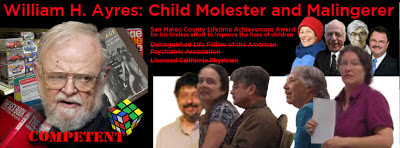Today, almost 40 years after Fromme donned a flowing red robe, strapped on a Colt .45, and went in search of President Gerald Ford, the Sacramento Bee has unveiled the full audiotapes of her 90-minute competency examination, which the court released in response to a legal request from the Bee.
Fromme's Sept. 5, 1975 mission remains a little fuzzy: Her goal was either to save the coastal redwoods or to call attention to the plight of her messiah, cult leader Charles Manson. Ford wasn't in much danger, as it turned out: There was no bullet in the chamber. She later said she had deliberatedly ejected the round in the chamber before leaving home.* And as soon as she pointed her pistol at Ford's stomach, Secret Service agents easily subdued her.
"I stood up and waved a gun (at Ford) for a reason," Fromme told a reporter a few years later. "I was so relieved not to have to shoot it, but, in truth, I came to get life. Not just my life but clean air, healthy water and respect for creatures and creation."
People who knew Fromme (pronounced Frahm-mee) considered her strange. But she rejected an insanity defense, and sought to represent herself, prompting Judge Tom MacBride to order a competency evaluation. A court-appointed psychiatrist, James Richmond, certified her as competent to stand trial after a 90-minute examination that was tape recorded at her request.
Under the legal standard at the time, one had to be nearly "a babbling idiot" to be found incompetent, in the words of the prosecuting attorney.
Fromme subsequently threw an apple at that very same U.S. Attorney, Dwayne Keys, when at her sentencing hearing he called for the severest punishment, saying she was "full of hate and violence."
"Nolan Ryan couldn't have thrown a more perfect strike," John Virga, the attorney ultimately appointed to represent her at trial, told a journalist some 30 years later. "Hit Dwayne right between the eyes. His glasses flew off. After that, guys in (Keyes') office started giving him a box of apples for Christmas."
Richmond, the court-appointed psychiatrist, had no problem with the "babbling idiot" standard. He said such a low standard was only fair, because "if a person is found unfit to stand trial, he can be committed to an institution for the criminally insane without being found guilty of anything."
The outcome of Fromme's trial, just two months after her arrest, was a foregone conclusion. Fromme boycotted much of the proceedings after the court declined her request to call Manson as a witness.
Looking back, Virga described his former client as "anything but crazy." "She's very bright, an intelligent, pleasant woman.When you talk with her, everything is fine until you mention Manson. Then it's like the guy who is perfectly normal until he hears 'Kokomo, Indiana.' Then he is off and running."
After being convicted of attempted murder and sentenced to life imprisonment, Fromme steadfastly declined to apply for parole. She was finally released in 2009, after serving 34 years in prison.
The outcome might have been different, had Fromme gone to trial today. Case law has raised the standards for competency to stand trial, and the standard is higher for defendants seeking to represent themselves. In 2012, following the U.S. Supreme Court's Edwards decision, California's high court ruled that even a defendant who is found competent to stand trial may be barred from self representation if mental illness prevents him or her from putting on a minimally adequate defense.
U.S. District Judge Kimberly J. Mueller released the audiotapes of Fromme's competency evaluation in response to a motion filed last November by the Sacramento Bee. Following the reasoning of the Ninth Circuit in a 1998 decision in the case of Ted Kaczysnki, the judge ruled that the public's right to know outweighed the defendant's privacy rights.
Kudos to the Bee for making this request before it was too late. The audiotape was fast degrading, and the court had to call in a professional media salvaging company to restore it before it could even listen to it and rule on the request.
On the tapes, Dr. Richmond can be heard questioning Fromme about everything from her involvement with the Manson family to her eating habits and her religion, using the slang vernacular of the day:
Richmond: "The press has made a number of comments to the effect that you’re a rather daft broad wandering about in this world, following ill-begotten causes and so forth. How do you feel about that?"
Fromme: "I’m working through it the best way I can. I feel this trial, conducted with a little bit of dignity, would help tremendously."
Fromme sounds matter-of-fact and confident, expressing optimism about her chances of being acquitted:
"Oh, I feel, I feel definitely I have probably a 70 percent chance on the percentage scale. I don’t feel that I’ll be convicted of attempted assassination."
In hindsight, her confidence was obviously misplaced.
* * * * *
The full audiotapes are HERE. Thanks to reporter Sam Stanton for alerting me. For those who don't have time to listen to all 132 minutes, a 19-minute excerpt is HERE. A subsequent media videotape of Fromme discussing her crime is HERE. I have added Fromme's case to my RESOURCE PAGE OF COMPETENCY CASES, which now includes source documents on 10 noteworthy cases ranging from Ted Kaczynski to Mike Tyson.
*Don't confuse this with a second assassination attempt on the president just 17 days later in San Francisco. Sarah Jane Moore managed to squeeze off a wild shot before she was subdued. Another odd duck, she too was found competent to stand trial.



























